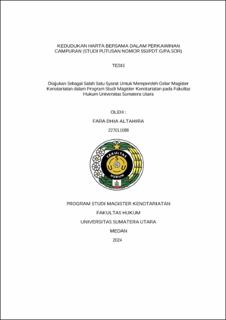| dc.description.abstract | Mixed marriages often result in marital property located outside Indonesia. In the event of a divorce, according to the provisions of the Marriage Law, marital property is typically divided equally, with half going to the husband and half to the wife. However, one party is often disadvantaged in the division, particularly when they feel they have contributed more during the marriage. As a result, the division of marital property in mixed marriages cannot be treated as a standard case, as one party may demand a greater share if they believe they have contributed more. One example of a mixed marriage case that filed for a resolution concerning marital property is the case between Sieska Sagita Nasution, an Indonesian citizen (WNI). and Pepijin Jochem De Blecourt, a foreign national (WNA), which was decided by Decision Number: 550/Pdt.G/PA.Sor.
This research seeks to address the following legal issues: (1) the legal consequences for marital property, such as land and buildings, in cases of divorce within mixed marriages; (2) the legality of a foreign national, after divorce, in granting power of attorney to sell their portion of the marital property, specifically land in Indonesia; and (3) how the law was applied by the panel of judges in the mixed marriage case between Sieska Sagita Nasution, an Indonesian citizen, and Pepijin Jochem De Blecourt, a foreign national. as decided in Decision Number: 550/Pdt.G/PA.Sor
The research method used in this study is a combination of normative legal research and empirical legal research. This research is descriptive-analytical, with data collection carried out through document studies, library research, and supported by field research.
The findings of this study show that the legal consequences for marital property. such as land and buildings, in divorce cases involving mixed marriages are that both the Indonesian and foreign nationals involved in the marriage remain entitled to half of the total value of the marital property, unless otherwise stipulated in a prenuptial agreement. As a result. marital property in these mixed marriages may include ownership of movable assets, such as land and anything attached to it by natural. human action, or its intended use. | en_US |


